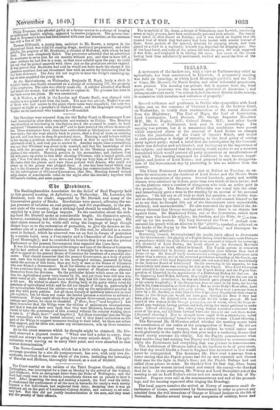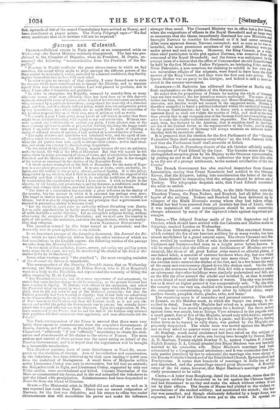IRBLAND.
A movement of the landowners, with a view to Parliamentary relief to agriculture, has been commenced in Limerick. A preparatory meeting was held on Saturday, at which Lord Monteagle presided, and the Earl of Clare, Mr. Blonsell, Sir David Roche, and other influential proprietors, were present. The meeting was private, but it appears from the local papers that " poor-rate was the monster grievance of discussion "; and arrangements were made " to collect facts from every district in the county, in connexion with taxation and valuation of property."
Several noblemen and gentlemen in Dublin who sympathize with Lord Roden met on the summons of Viscount Lorton, at the Leitrim Hotel;. on Wednesday, to testify their condemnation of the recent dismissals from the Magistracy. The Earl of Mayo, the Earl of Enniskillen, Lord Castlemaine, Lord Downes, Mr. George Augustus Hamilton M.P., Mr. J. Napier, M.P., Colonel Bruen, 5I.P., and other Lords and Members of Parliament, took part in the proceedings. The meeting was private, but it is announced that resolutions were passed which expressed alarm at the removal of Lord Roden on charges within the jurisdiction of the Court of Queen's Bench, and traced in such proceedings a design of reverting to the fatal policy of setting party against party; stated a belief that the investigation by the Commis- sioner was defective and misdirected, and inadequate to the importance of the subject; and declared that the meeting would rejoice to see a measure introduced which would prevent all party processions or manifestations of any kind. The meeting expressed its confidence in the honour, impai- tiality, and justice of Lord Roden; and proposed to mark its disapproba- tion of the Government step by presenting to him an address from the country.
The Ulster Protestant Association met at Belfast on Tuesday, to ex- press its sentiments on the dismissal of Lord Roden and the Messrs. Beers. from the commission of the peace. Several hundreds, gentry and middle classes, were admitted by tickets, more than two-thirds of them ladies; and.
on the platform were a number of clergymen who took an active part in the proceedings. The Marquis of Downshire was voted into the chair
and immediately gave a tone to the meeting by an avowal of his personal
opinion. "He did not at all wish to shirk the question, or to shelter him- self as chairman by silence; and therefore he would commit himself so far as to say that he thought this act of the Government most unjustifiable, arbitrary, and unwarrantable." He also contested the ipso dixit of the At- torney-General that Orange meetings are illegal : there is no statute law against them. Mr. Blackwood Price, one of the Secretaries, called upoi. every man who loved his religion, his freedom, and his Bible, to
self up for the contest. The Very Reverend the Dean of .a.rdag°h com- menced his speech with an allusion to the " revolution achieved on the banks of the Boyne by the brave Euniskilleners," and thereupon be- came "deeply affected."
Recovering himself, he recapitulated the insults lately offered to Protestants by the Government: the placing of a Popish Bishop before Ireland's noble Duke,— a precedency which the noble Duke ought to be ashamed of himself for enduring; the dismissal of Lord Roden ; the insult offered to the Reverend Mortimer O'Sullivan; and an insult offered to himself. The Popish system of education had been established in Ireland, and an inquisition more hideous than that of
Rome set up. He himself lately recommended a clergyman for preferment little better than a curacy, and on the reverend gentleman attending at the Castle, one
of the servants of the head Inquisitor came out and asked him if be were friendly
to the National Board of Education? On his answering in the negative, he was immediately told there was nothing for him at the Castle. Then Lord Clarendon
had attended to the recommendation of the Popish Bishop and the Popish Cor-
poration of Limerick in the appointment of a Protestant Bishop for that see. As for disgracing Lord Roden, however, they might as well try to put the sun out in the firmament: nevertheless, lie was not himself quite pleased with Lord Roden or his scanty hospitality: if the Orangemen were to come to his lawn, the best he had in his house should be at their disposal. But as to the Dolly's Brae affair, Lord Roden had done nothing but give good advice. The Dean read a passage froma letter by a Mr. Jardine, to show that the two Stipendiary Magistrates were alone to blame, as the Orangemen would not have gone through the Brae if they had been asked not. He finished with an anecdote for the ladies present. He had
heard of two women in the Orange procession, one of whom, when the lodge re- quired gun-wadding, having powder and ball, cut up her under. petticoat to make some. (Great cheering.) .Che other young woman snatched a standard from some of the men, and led them forward when she thought she saw them waver. (Renewed cheering.) Now he thought there ought to be a commission, called the "petticoat commission," issued to try these young women. (Loud cheering.)
The Reverend Mr. 51-Illwaine asked whether the meeting would have the constitution of the realm or the propagandism of Rome? He did not want to draw the carnal weapon, but as a citizen he would rather meet death gloriously in the battle-field than pine under a cankering disease that would slowly consume his vitality. Let the Papists commemorate what they could—they had nothing but Popery and bloodshed to commemorate; while the Protestants had everything that was glorious to commemorate. The Archdeacon of Dromore called on his brethren to be of good cheer, for that day would kindle a flame in England that he trusted in God would never be extinguished. The Reverend Mr. Drew read a passage from a letter stating that the Popish priests had fed up and seasoned and blessed their men for the fight in Dolly's Brae; yet the Popish Bishops had not called those priests to order. He thanked God for that day, when brave men and tender women turned round and routed the enemy—he thanked God for it. At the conclusion, Mr. Watson and Lord Downshire asked the
meeting to act on Lord Roden's advice and not march on the 5th of No- vember. Prayers were said at the commencement and end of the proceed- ings, and the meeting separated after singing the Doxology.
The local papers mention the arrival at Newry of numerous small de- tachments of troops, concentrated by Government in order to prevent any mischief from the evil intentions of Orange or Riband factions on the 5th of November. Besides several troops and companies of soldiery, horse and
foot, upwards of 300 of the armed Constabulary have arrived at Newry, and been distributed at proper points. The Newry Telegraph says—" We feel every confidence that their services will not be required."



























 Previous page
Previous page